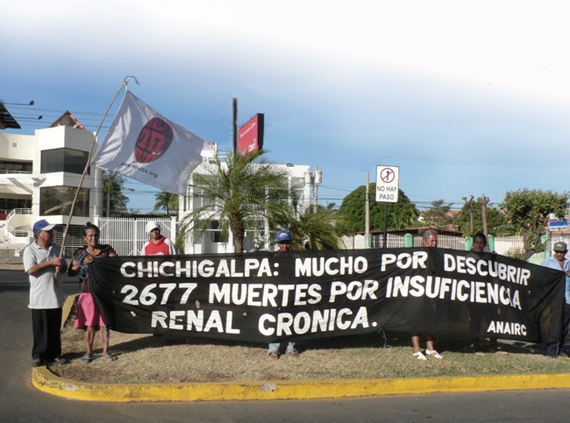|
With Silvio Baltodano Flores
We’re only asking
for what is rightly ours
As
executives of Ingenio San Antonio, property of Nicaragua Sugar Estates
Ltd, a company of the Pellas Group, announce with great fanfare the
shipment to Europe of a total of 40 million liters of ethanol -half of
its expected production for 2009- and the increase of its daily
distillation capacity to up to 500 thousand liters, which will bring it
some 60 million dollars in foreign exchange, the former sugarcane
workers and widows of ANAIRC, an affiliate of the IUF, continue to camp
out in Managua demanding reparation for damages arising from their work
in the company’s fields and facilities.
Silvio
Baltodano Flores
is one of these former workers. For nine years he worked at Ingenio
San Antonio, in tasks that included mixing agrotoxic chemicals and
spraying them in the fields. He is one of the victims.
Chronic Renal Failure (CRF)
has brought him to the brink of death, having permanently compromised 57
percent of his kidney function.
When the company realized that “he was hit” (sick), it stopped hiring
him and told him to request his pension from the Social Security
agency.
Sitting
on one of the hammocks at the camp, Silvio tells
Sirel his story,
demanding that the owners of Ingenio San Antonio respond for the
damage caused to thousands of people.
-What
year did you start working for Ingenio San Antonio?
-I
started working in 1992, participating in an agricultural research
study. I worked with different kinds of agrotoxic chemicals, including
Roundup, Gramoxone, 2,4-D, Hexazinone (Velpar),
and Diuron (Gesapac), among others.
We
applied them to small plots, where different varieties of sugarcane were
planted, with the aim of selecting them, for large-scale planting. Once
selected, the agrotoxic chemicals were used massively. I worked during
two different periods of time. In the second period, I worked for nine
straight years, winter and summer, and in 2001 I came out with a 1.9
level of creatinine in my blood.
|
I have a family, and
sometimes my kids have nothing to eat. When I go looking for
work in the fields they turn me down because of my condition,
and when I do get something in construction, after two or
three days I can’t go on because I’m too tired,
and I have to quit. |
When I
showed up to “hook up” for the next harvest, they sent me for a medical
examination, as they always did. The company doctor saw how high my
creatinine level was, and he told me to drink a lot of water and eat
things like pineapple, to bring down the creatinine level. But instead,
it went up to 2.2. Finally he told me: “We’re really sorry but we can’t
hire you. You’re ‘hit,’ you’re sick; so you better go to the Social
Security agency to get your pension.”
Years
later, I’m still waiting for that pension.
-How
were these agrotoxic chemicals applied?
-First
we mixed the product, then we added water to it, and we filled up the
pumps to spray it manually. Usually this meant these products would drip
onto our backs and our bodies.
-Did
this happen often?
-Almost
always. I remember once I was practically drenched in Gramoxone (Paraquat),
and three days later I had burns all over my body. I called the
engineer and they sent me to the hospital, but a week later I was
working again.
There’s
no doubt in my mind that this disease I have now is a result of having
been in constant contact with the agrotoxic chemicals.
Another
problem was the lack of water. We each had to carry our own water
bottle, but we would finish the water quickly, and then we would have to
go thirsty until we returned from the fields.
-How is
your health now?
-My
creatinine level has been 1.9 for years, and the last test I had done
showed that 57.25% of my kidney function is compromised.
-How
are you getting along?
-My
brothers help me, but it’s hard. I have a family, and sometimes my kids
have nothing to eat. When I go looking for work in the fields they turn
me down because of my condition, and when I do get something in
construction, after two or three days I can’t go on because I’m too
tired, and I have to quit.
-What
are you asking from the company?
-Ingenio
San Antonio has to find a solution to this problem. They know we’re
former workers, that we worked for them, and that it is thanks to our
work that they’ve gotten where they are.
This illness is like a
cancer; it doesn’t stop until it kills you. When I went in to work at
Ingenio San Antonio, I was healthy, and I came out of there sick.
Camping out here with me in Managua there are widows and parents who
have watched their sons and daughters die. And there are many more who
are not here, who stayed back in Chichigalpa. We’re carrying out this
struggle to receive compensation for what happened to us, to obtain what
is due to us.
-If you
could talk to the owner of the company, what would you say to him?
-I
would tell him to look into his heart and value us for the human beings
that we are. We hope to receive an answer soon, and we’re willing to
stay here staging this civic and peaceful, but firm protest, until we
get a solution.
 |